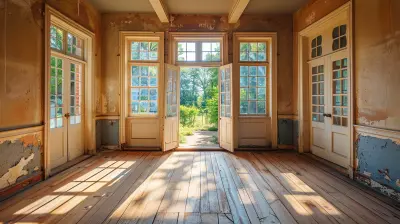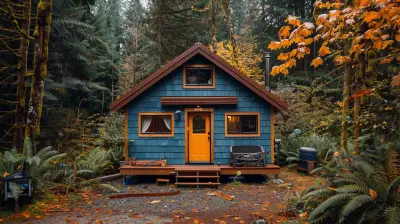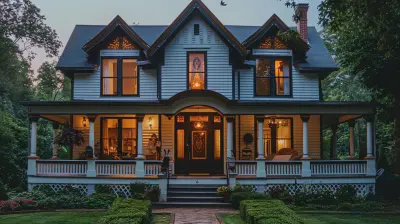31 December 2024
Short-term rentals, like those you find on Airbnb or Vrbo, have quickly become a hot topic in the housing market. They’ve disrupted traditional models, given homeowners new revenue streams, and provided travelers with unique lodging options. But, at the same time, they’ve sparked debates about housing affordability, neighborhood character, and the supply of long-term housing. So, what exactly is the role of short-term rentals in the housing market? Let’s break it down and see both the bright and not-so-bright sides of the story.
What Are Short-Term Rentals?
Before diving in, let’s clarify: a short-term rental (STR) is typically a property rented out for less than 30 days at a time. Think about that cute beach house you booked for a weekend getaway or the downtown apartment you stayed in for a conference. These rentals are often listed on online platforms (Airbnb being the most famous example), making it super easy for property owners to connect with renters.Short-term rentals can range from a spare bedroom in someone’s home to entire luxury villas. They’ve brought a lot of convenience and flexibility to the table for travelers, but they’ve also shaken up the housing market in ways that can't be ignored.
How Do Short-Term Rentals Impact the Housing Market?
The relationship between short-term rentals and the housing market is complicated, to say the least. Depending on who you ask, they’re either an ingenious use of property or a nightmare for housing affordability. Let’s break down some of the major points.1. Boosting Property Owners’ Incomes
One of the main arguments in favor of short-term rentals is how they empower property owners financially. Got an unused guest room? List it. Going away for a month? Rent out your place while you’re gone. STRs give people a chance to generate passive income, which can help cover mortgage payments, property taxes, or even day-to-day expenses.For real estate investors, STRs can be a goldmine. A property rented out on a nightly basis often generates more income than it would as a traditional long-term rental. This added income potential has sparked a new wave of interest in real estate, with investors buying homes specifically to turn them into STRs.
But here’s the flip side: what happens when too many homes are being bought for STR purposes? That’s where things start to get tricky.
2. Reducing Affordable Housing Supply
Let’s not sugarcoat it—one of the biggest criticisms of short-term rentals is their role in reducing the supply of affordable housing. When property owners and investors prioritize short-term rental listings over long-term leases, it can shrink the pool of available homes for locals. If a neighborhood becomes a hub for STRs, regular folks may struggle to find housing at reasonable prices.Think about it like this: If everyone’s renting out spare rooms to vacationers, where do the teachers, nurses, and other locals live? Some cities have seen drastic rental price hikes partly due to STR proliferation, prompting local governments to step in and regulate them (more on that later).
3. Changing Neighborhood Dynamics
Short-term rentals don’t just shake up housing availability—they can also change the vibe of a neighborhood. If you’ve ever lived next to a revolving door of vacationers, you know it’s not always great. Noise complaints, parking issues, and a loss of community cohesion are all common frustrations.While tourists bring life and energy to an area, there’s also something to be said about knowing your neighbors. STR-heavy areas can feel more transient and less like home, which can be a turn-off for families and long-term residents.
Short-Term Rentals: A Boost for Local Economies?
Let’s not forget the upside. Short-term rentals can inject a lot of money into local economies. Travelers staying in STRs tend to spend on restaurants, shops, and attractions nearby. For smaller towns or less touristy areas, STRs can be a lifeline, drawing visitors who might otherwise have skipped those destinations.Additionally, STR-related jobs—like property management, cleaning services, and maintenance—create employment opportunities for locals. In this sense, short-term rentals can act as economic engines, especially in areas dependent on tourism.
The Role of Regulations: Necessary or Overreach?
Like every good thing in life, short-term rentals need balance. That's where government regulations come in. Several cities around the globe have implemented strict rules to address the negative impacts of STRs. Some of these regulations include:- Capping the Number of STRs: Cities like Barcelona and San Francisco have set limits on how many short-term rental properties can exist in one area.
- Requiring Licenses or Permits: Many areas now require STR hosts to register their properties and adhere to specific guidelines.
- Limiting Stays: Some cities only allow a property to be rented out for a certain number of days per year, ensuring it's not exclusively used as a short-term rental.
While these measures often aim to protect long-term housing markets, critics argue that they can stifle property owners’ rights. After all, if you own your home, shouldn’t you get to decide how to use it?
What the Future Holds for Short-Term Rentals
Short-term rentals aren’t going anywhere anytime soon. In fact, they’re expected to keep growing as more people embrace remote work and digital nomad lifestyles. But their role in the housing market will likely continue to evolve.The key lies in striking a balance. Can cities manage STR growth without sacrificing affordable housing? Can property owners and communities find common ground? Only time will tell, but one thing’s for sure: short-term rentals are reshaping the housing market in ways we’re only beginning to understand.
Tips for Buyers and Investors Interested in STRs
If you're tempted to jump on the short-term rental bandwagon, here are some things to keep in mind:1. Research Local Regulations: Before buying a property, find out if STRs are even allowed in that area. Some cities have outright bans or tight restrictions.
2. Consider the Costs: STRs might generate more revenue, but they also come with higher expenses (cleaning fees, furnishing costs, platform fees, etc.).
3. Think About Location: Properties near tourist attractions or downtown areas are usually more profitable, but competition is fierce. Unique or under-the-radar locations can be a hidden gem.
4. Treat It Like a Business: Successful STR hosting requires effort—marketing, customer service, and maintenance don't handle themselves.
Wrapping It Up
So, what’s the takeaway? Short-term rentals serve multiple roles in the housing market. They offer financial freedom to property owners, boost tourism, and diversify lodging options. At the same time, they contribute to housing shortages and disrupt community dynamics. They’re like that double-edged sword—useful but not without risks.For the housing market to thrive alongside the STR boom, there needs to be a balance. Regulations, thoughtful investments, and community-conscious hosting can all play a role in ensuring short-term rentals benefit everyone—not just a few.











Honor Hensley
Great insights! Short-term rentals definitely add a unique flavor to the housing market. They can provide flexibility for travelers and create income opportunities for homeowners. It's all about finding that perfect balance!
March 29, 2025 at 12:40 PM